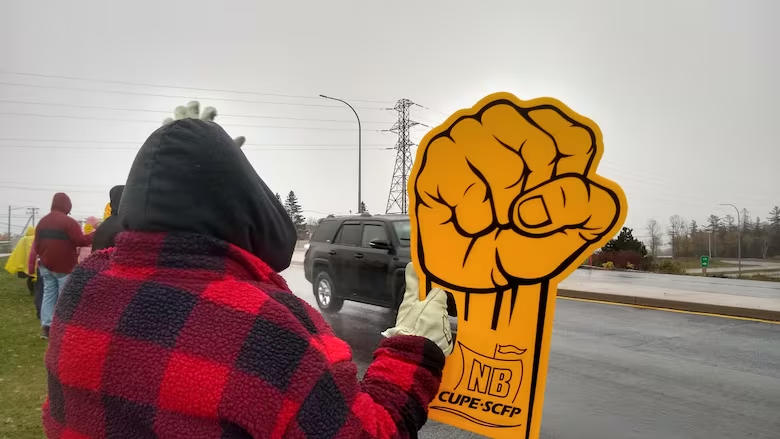Ordering CUPE back to work won't be a simple process for Higgs, says labour lawyer
Premier is threatening to create back-to-work legislation for at least some CUPE workers

The Higgs government will be facing legal and procedural obstacles if it tries to force striking public-sector workers back to work when the New Brunswick Legislature reconvenes Tuesday.
Premier Blaine Higgs says he's looking at back-to-work legislation that would order some or all striking members of the Canadian Union of Public Employees to end their walkout.
But that route is not a simple one. Nor is the premier's other option: using the province's COVID-19 state of emergency.
It has been rare for a provincial government to use back-to-work legislation since 2015, when the Supreme Court of Canada ruled the right to strike is protected by the Constitution.
Ontario passed back-to-work legislation to end a five-week strike at community colleges in 2017 and a five-month strike at York University in 2018.
"I'm sure government lawyers across the country have looked at it and decided to step away, and I'd be interested to see if New Brunswick thinks somehow that they can get away with it," says Ottawa labour lawyer Paul Champ.

The 2015 ruling quashed the Saskatchewan government's attempt to unilaterally decide which unionized workers were essential and then ban them from striking.
"The right to strike is an essential part of a meaningful collective bargaining process in our system of labour relations," it said. "It is an indispensable component of that right."
Champ says that means any government seeking to restrict that right "is going to have an uphill battle to try to justify it."
Another obstacle is timing.
The government swept away one time-gobbling obstacle Monday by cancelling the speech from the throne scheduled for Tuesday.

That also means no Official Opposition reply to the speech Thursday, freeing up two days for regular business.
"Not having a throne speech does give us additional flexibility that allows us to move quicker as needed," Higgs said Monday, though he said there would be no bill introduced Tuesday.
Still, any bill must be read and voted on three times and must also go through a committee review.
And under the legislature's rules, each of those four steps must happen on a different sitting day.
The only way that timeline can be further compressed is if all MLAs grant unanimous consent to bypass the rules, something Green Party house leader Kevin Arseneau says will not happen.

"Absolutely not," he says. "There will be no unanimous consent for back-to-work legislation. Absolutely not."
Arseneau says on top of refusing to consent to accelerating the timeline, the Greens are also looking at other procedural tools to slow it down.
"There's many different ways of slowing down or putting pressure on bills," Arseneau says.
If a bill is eventually passed, it will likely be subject to a legal challenge based on the 2015 Saskatchewan case, Champ says.
Higgs said Monday that a back-to-work bill would also include a "wage mandate" to impose pay increases on CUPE rather than sending that issue to binding arbitration.

He also said another option is the Emergency Measures Act, which says the province can "provide for the maintenance and restoration of essential facilities" during an emergency.
That would apply only narrowly to "more specific" situations that affect pandemic efforts, he said.
The emergency order is also subject to the Charter of Rights and Freedoms, and Champ says applying it to only a very narrow number of health workers would be the only way it would have a chance of surviving a court challenge.
But even then, he says the province may have a hard time.
Clerical and housekeeping staff who had been working at regional health authority clinics are members of CUPE Local 1252 but were not designated essential, so they're able to strike.

The designation of essential workers happened before the clinics began operating, and CUPE has not agreed to change the designation now that the strike is underway.
CUPE 1252 president Norma Robinson said the dispute has been on the horizon for months and the province didn't approach the union about redesignation until the last few days.
"They had lots of time," she said.
The government could also have asked the New Brunswick Labour and Employment Board by now for a redesignation, Champ says.
"If New Brunswick was running into a potential labour dispute some time ago and they had a designated worker list that was pre-COVID, I would think it would have been incumbent on the government to bring such an application before the labour board before they reach a situation of crisis."
Because it hasn't done so, he says it will be hard to argue during any legal challenge that the province had no choice but to use a back-to-work bill or the emergency order to force those workers back to work.
Corrections
- An earlier version of this story said no government in Canada has used back-to-work legislation since 2015. This was based on erroneous information from Paul Champ. In fact the federal government passed back-to-work legislation in 2018 to stop rotating strikes by the Canadian Union of Postal Workers. That legislation was challenged by CUPW using the 2015 Supreme Court ruling. The case remains before the courts.Nov 02, 2021 11:11 AM EDT

